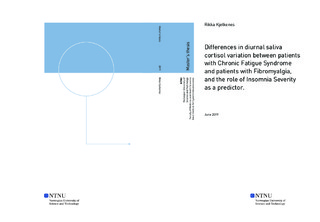| dc.description.abstract | Objective: Chronic Fatigue Syndrome/Myalgic Encephalomyelitis (CFS/ME) is a severe chronic disease, that severely impacts the quality of life. The underlying pathophysiology of CFS/ME is still unknown, but a substantial body of research has focused on the potential role of the hypothalamic-pituitary-adrenal (HPA) axis. The overarching aim of this study was to further examine the differences in HPA axis functioning in CFS/ME and Fibromyalgia patient groups. This was done by examining diurnal cortisol variance, and evening cortisol levels using saliva samples.
Method: Female patients with CFS/ME (n = 18) and Fibromyalgia (n = 15) were recruited from a 10-week specialized multidisciplinary rehabilitation program in Trondheim, Norway. Six saliva cortisol samples were collected from each participant at fixed time points throughout the day. Participants also completed self-report questionnaires assessing their level of insomnia severity, fatigue, anxiety, depression, and pain intensity.
Results: CFS/ME patients exhibited significantly less cortisol variation within a day, compared to fibromyalgia patients. Insomnia severity was not a significant predictor of cortisol variation within a day. However, higher levels of insomnia were significantly associated with higher levels of cortisol in the evening irrespectively of primary diagnosis.
Conclusion: CFS/ME patients had significantly less cortisol variance than fibromyalgia patients, still they do not significantly differ in levels of symptoms such as fatigue, pain intensity, insomnia severity, anxiety, and depression. This may indicate that significantly lower cortisol variance is maintained by other mechanisms in CFS/ME patients compared to Fibromyalgia patients, further suggesting different pathophysiology between the two disorders. | |
